Brevo, formerly known as Sendinblue, remains a strong player in the email marketing space, especially for those looking for affordability and omnichannel features.
It offers email marketing, SMS campaigns, CRM tools, and automation—all under one roof. But it’s not perfect.
Many ecommerce businesses outgrow Brevo quickly due to its interface limitations, lack of deep ecommerce integrations, and occasionally underwhelming deliverability.
Whether you’re scaling a Shopify store, managing multiple product SKUs, or looking to improve segmentation, it’s important to explore options better tailored to your needs.
Below, we’ve broken down the best Brevo alternatives specifically for ecommerce stores, based on functionality, pricing, and overall effectiveness.
Each tool is explained in-depth, complete with key features, use cases, and who it’s best suited for.
Brevo Competitors Summary Comparison Table
| Tool | Best For | Free Plan | Ecommerce Focus | Price (1k Contacts) |
|---|---|---|---|---|
| HubSpot | Full CRM + email automation suite | Yes | Medium-High | $45/month |
| Klaviyo | Shopify & DTC brands | Yes | High | $20/month |
| Omnisend | Multichannel messaging | Yes | High | $16/month |
| MailerLite | Beginners & small stores | Yes | Medium | $10/month |
| Moosend | Budget ecommerce automation | Yes | Medium-High | $9/month |
| ActiveCampaign | Advanced automation & CRM | No | Medium | $15–49/month |
| Kit | Creators & digital products | Yes | Medium | $15/month |
TL;DR – Best Brevo Alternatives for Ecommerce in 2025
Looking for a better alternative to Brevo for email marketing and automation? Here are the top tools ecommerce brands are switching to:
- HubSpot – All-in-one CRM and marketing platform with deep automation, perfect for growing ecommerce brands
- Klaviyo – Best for Shopify stores that want high ROI from advanced segmentation and product-based emails
- Omnisend – Great for multichannel messaging with email, SMS, and push notifications
- MailerLite – Affordable and easy to use for smaller stores or startups
- Moosend – Budget-friendly automation with ecommerce-ready templates
- ActiveCampaign – Ideal for complex email funnels and full-lifecycle customer journeys
- Kit (formerly ConvertKit) – Best for creators and stores selling digital products
These platforms offer better ecommerce integrations, stronger automations, and more reliable deliverability than Brevo.
1. HubSpot
Best for: Ecommerce brands needing a full CRM + marketing automation suite
HubSpot is much more than just an email marketing platform—it’s a full suite that includes CRM, marketing, sales, and customer service tools all in one place.
While it’s not built exclusively for ecommerce, it offers powerful automation, advanced segmentation, and deep personalisation that make it a great option for brands ready to scale both their marketing and operations.
With HubSpot, you get access to tools like email workflows, dynamic content, lead scoring, and customer journey mapping.
What sets HubSpot apart is its seamless CRM integration—your marketing campaigns are fully tied to your sales data, giving you a complete picture of each customer’s lifecycle.
This level of insight helps ecommerce brands personalise every message and maximise repeat sales.
Although the learning curve is steeper than with platforms like MailerLite or Omnisend, HubSpot’s all-in-one functionality pays off for brands looking to manage marketing, sales, and customer service from one platform.
It also integrates with Shopify and WooCommerce via native plugins, allowing you to sync product, order, and customer data automatically.
Key ecommerce features:
- Built-in CRM for detailed customer data tracking
- Advanced workflow automation
- Dynamic content and personalisation options
- Integration with Shopify, WooCommerce, Magento, and more
- Built-in live chat, forms, and customer support tools
Pricing:
| Plan | Monthly Price | Contacts Included | Notes |
|---|---|---|---|
| Free Plan | $0 | Up to 2,000 emails/month | Includes CRM, basic email tools |
| Starter Plan | $45/month | 1,000 contacts | Adds automation and advanced forms |
| Professional | $800+/month | 2,000+ contacts | Includes full workflows, A/B testing, custom reports |
Why it’s better than Brevo:
HubSpot offers more scalability, deeper CRM functionality, and better reporting for ecommerce teams looking to manage customer relationships and marketing in one place.
2. Klaviyo
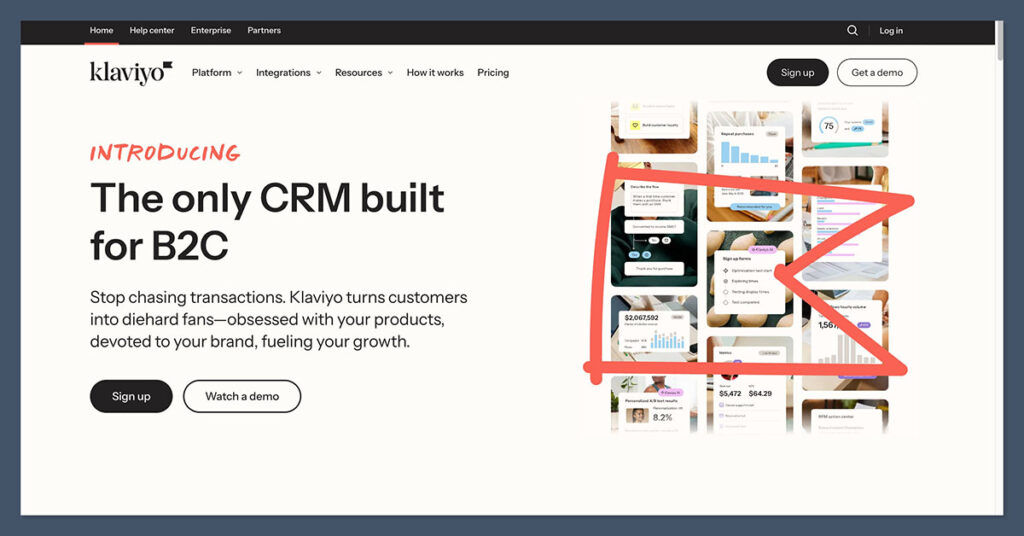
Best for: Shopify brands and stores focused on high ROI per email
Klaviyo is purpose-built for ecommerce, offering advanced flows and granular segmentation features.
Its direct integration with platforms like Shopify, WooCommerce, and BigCommerce allows you to track customer behaviour in real-time, so your campaigns stay relevant and timely.
Unlike Brevo, Klaviyo offers prebuilt flows tailored for ecommerce, such as abandoned cart reminders, browse abandonment, win-back campaigns, and upsell flows.
Its dashboard is intuitive and provides detailed metrics like revenue per recipient, open rate by product segment, and customer lifetime value.
Key ecommerce features:
- Predictive analytics (like churn risk or next order date)
- Drag-and-drop flow builder
- Deep integration with Shopify, BigCommerce, WooCommerce
- Real-time syncing of customer data and purchase history
Pricing (Email only):
| Contacts | Monthly Price | SMS Add-On |
|---|---|---|
| 250 contacts | Free | Optional |
| 500 contacts | $20/month | Optional |
| 5,000 contacts | $100/month | Optional |
Why it’s better than Brevo:
Klaviyo gives ecommerce stores more advanced targeting options, clearer revenue attribution, and stronger Shopify-native integrations.
3. Omnisend
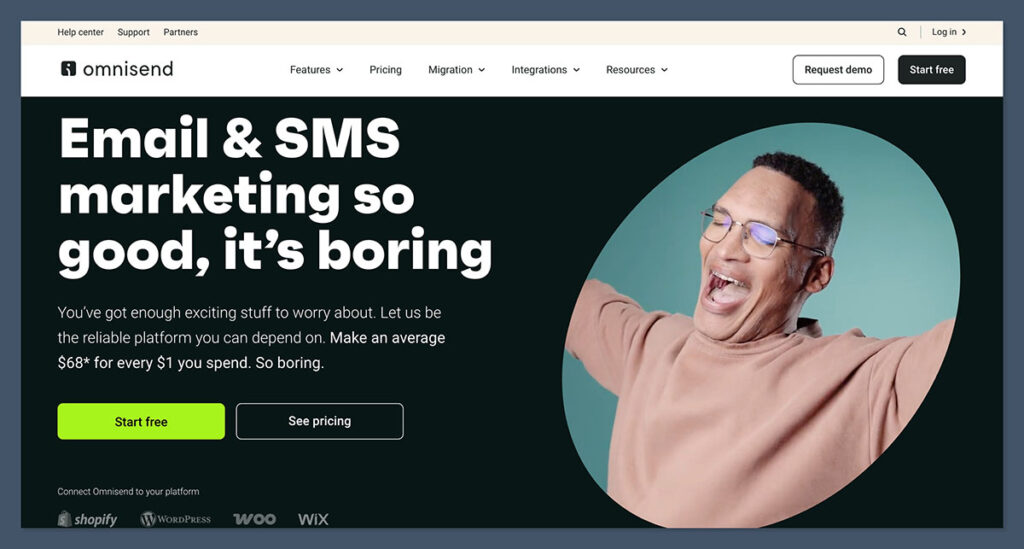
Best for: Brands using email, SMS, and push notifications together
Omnisend is another ecommerce-first platform that goes beyond just email. It lets you build multichannel automation flows, combining email, SMS, and push notifications in a single workflow.
For ecommerce brands trying to build stronger customer journeys across multiple touchpoints, this is a huge plus.
What sets Omnisend apart is its ability to use shopping behaviour and order data to create highly personalised messages. For example, you can send different abandoned cart messages based on total cart value, products viewed, or repeat purchase status.
Key ecommerce features:
- Multichannel automation (email + SMS + push)
- Pre-built ecommerce workflows
- Product picker for dynamic content
- Drag-and-drop campaign builder
Pricing:
| Contacts | Monthly Price | SMS Included? |
|---|---|---|
| 250 contacts | Free | No |
| 500 contacts | $16/month | 60 free SMS/mo |
| 5,000 contacts | $65/month | Included tiers |
Why it’s better than Brevo:
Omnisend makes multichannel marketing simple, has better automation for ecommerce, and the free plan is more generous with ecommerce features.
4. MailerLite
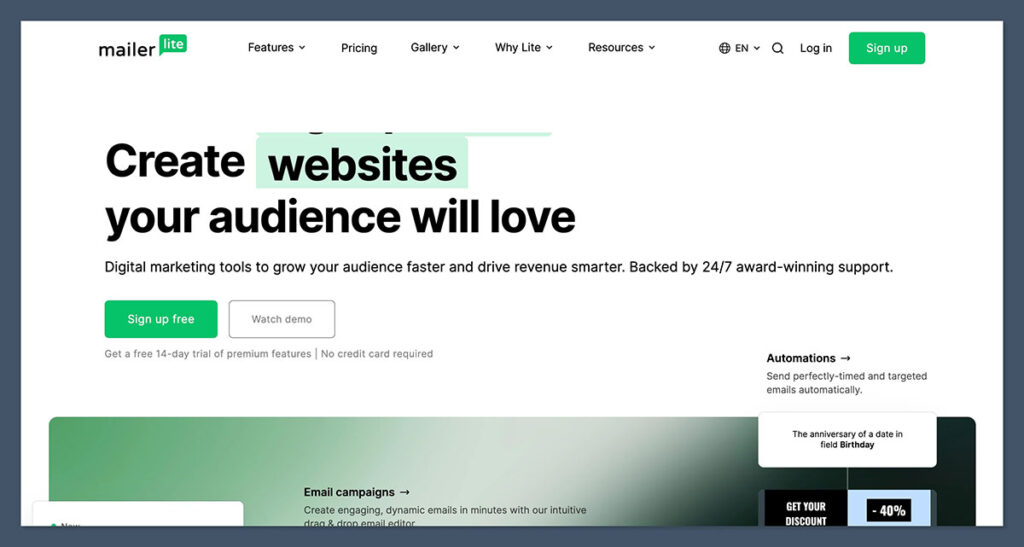
Best for: Small ecommerce brands and beginners
MailerLite is an affordable and clean email marketing tool that’s perfect for ecommerce stores on a budget. It offers strong core features like drag-and-drop editing, automation, and ecommerce-friendly integrations with Shopify and WooCommerce.
Though it lacks some of the more advanced options that Klaviyo and Omnisend offer, MailerLite still gets the job done—especially for smaller teams who want fast setup, lead generation tools, and clean reporting.
Key ecommerce features:
- Shopify, WooCommerce, BigCommerce integration
- Ecommerce automation templates
- Drag-and-drop email builder
- Pop-ups and landing pages
Pricing:
| Contacts | Monthly Price |
|---|---|
| 1,000 contacts | Free (12,000 emails/mo) |
| 1,000 contacts | $10/month (unlimited emails) |
| 5,000 contacts | $32/month |
Why it’s better than Brevo:
MailerLite is faster, easier to use, and the free plan gives you more freedom without locking away basic ecommerce features.
5. Moosend
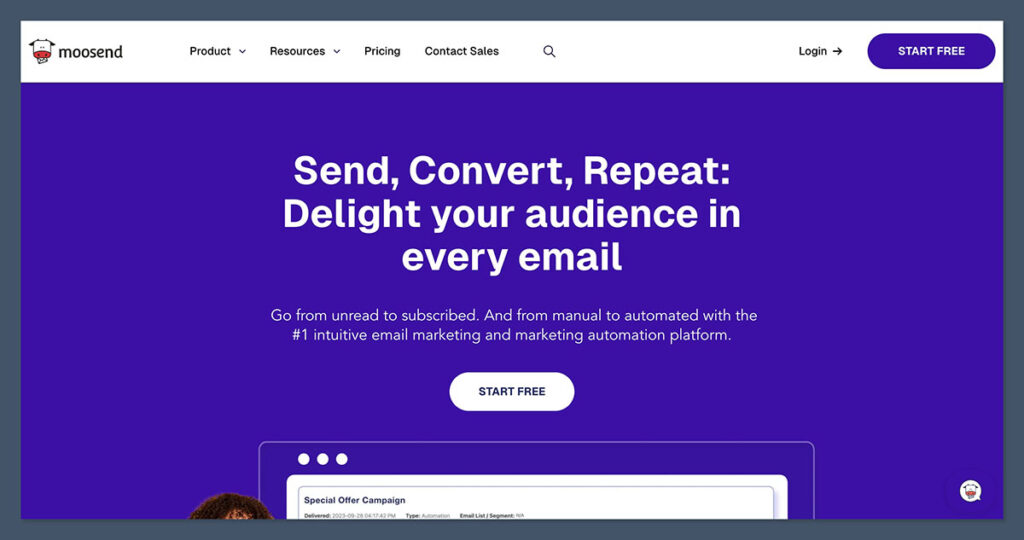
Best for: Growing stores looking for affordable automation
Moosend offers a powerful feature set at a very competitive price point. It comes with behavioural tracking, segmentation, and ecommerce templates to help you set up email workflows quickly—without touching code.
Its drag-and-drop automation builder is similar to Klaviyo’s, but simpler to use.
The platform also includes product recommendation blocks and real-time analytics. Moosend integrates well with ecommerce platforms like Shopify and Magento, and supports API-based custom connections too.
Key ecommerce features:
- Behaviour-based email triggers
- A/B testing
- Product recommendation engine
- Ecommerce reporting
Pricing:
| Contacts | Monthly Price |
|---|---|
| 1,000 contacts | Free (limited features) |
| 2,000 contacts | $9/month |
| 5,000 contacts | $48/month |
Why it’s better than Brevo:
Moosend delivers better automation tools and ecommerce-specific features at a lower price point—making it a smart choice for scaling brands.
6. ActiveCampaign
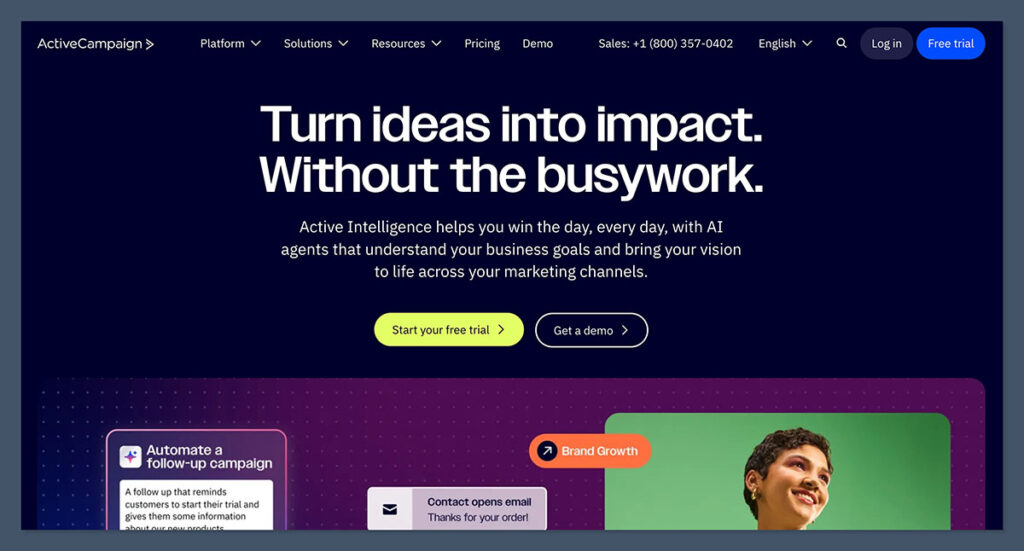
Best for: Advanced ecommerce funnels and lead nurturing
ActiveCampaign combines email marketing with built-in CRM tools and advanced automation capabilities.
While not ecommerce-exclusive, it offers powerful workflows that can be customised to every stage of the customer journey—especially if you’re running multiple lead magnets, product funnels, or high-ticket offers.
With native integrations for Shopify, WooCommerce, and BigCommerce, plus the ability to trigger automations based on customer activity, ActiveCampaign is ideal for brands that want both marketing and CRM functions in one.
Key ecommerce features:
- Deep segmentation and tagging
- Dynamic content for personalisation
- Site tracking and event-based triggers
- Full CRM with lead scoring and pipelines
Pricing:
| Contacts | Lite Plan | Plus Plan |
|---|---|---|
| 500 contacts | $15/month | $49/month |
| 5,000 contacts | $99/month | $149/month |
Why it’s better than Brevo:
ActiveCampaign offers way more control over segmentation, lead scoring, and full-lifecycle marketing—perfect for brands selling across multiple channels.
7. Kit (formerly ConvertKit)
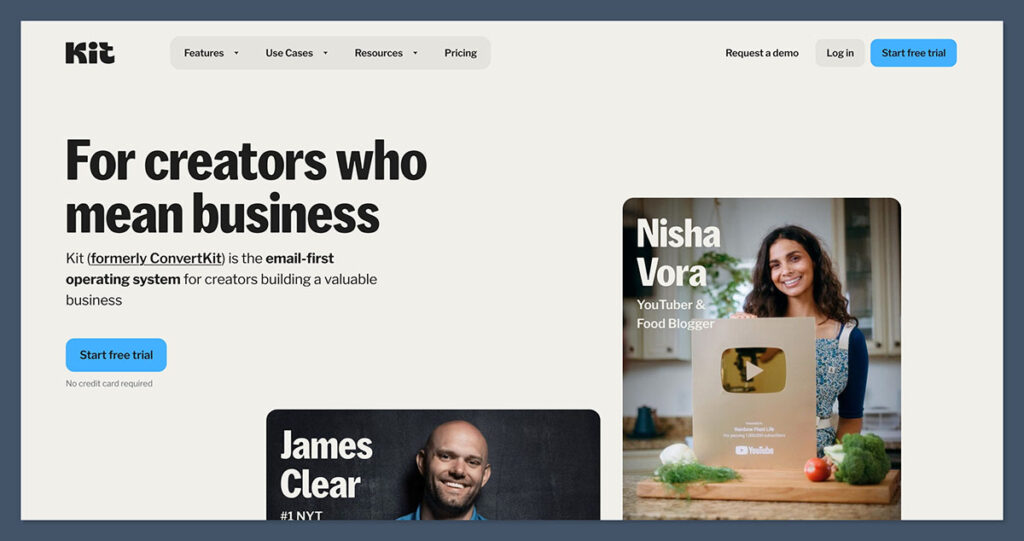
Best for: Creators and brands selling digital products
Kit (formerly ConvertKit) is a creator-first platform that’s slowly evolved to include ecommerce features like product sales, automated sequences, and integrations with Shopify.
While it’s not as robust as Klaviyo or Omnisend for physical ecommerce, it’s an excellent option for brands selling digital products, courses, or low-SKU catalogues.
Its visual automations and tagging system make it easy to segment subscribers, deliver lead magnets, and build post-purchase email sequences.
Key ecommerce features:
- Landing pages and email opt-ins
- Smart tagging and segmentation
- Automation builder
- Sell products and courses natively
Pricing:
| Contacts | Monthly Price |
|---|---|
| 1,000 contacts | Free |
| 1,000 contacts | $15/month |
| 5,000 contacts | $66/month |
Why it’s better than Brevo:
ConvertKit is easier to use for solopreneurs and digital-first businesses, with powerful tagging and fast email setup.
Final Thoughts: Choosing the Right Brevo Alternative
Brevo is a solid entry-level platform, but it quickly becomes limiting for ecommerce businesses that want deeper integrations, stronger automation, and better multichannel support.
Whether you’re running a Shopify store, selling digital products, or managing a high-volume WooCommerce setup, there’s a better tool out there for your growth goals.
Klaviyo and Omnisend stand out if you need advanced ecommerce automation.
MailerLite and Moosend offer excellent value for smaller stores or teams just getting started.
ActiveCampaign gives you full control over customer journeys, while ConvertKit is a go-to if your business leans toward digital products or content-first marketing.
The right tool depends on your store size, revenue targets, and how hands-on you want to be with your email marketing. But every option on this list is a step up from Brevo in terms of performance, scalability, and ecommerce focus.
Take advantage of free plans or trials, test how each platform fits your stack, and choose the one that makes execution easier—not harder.
